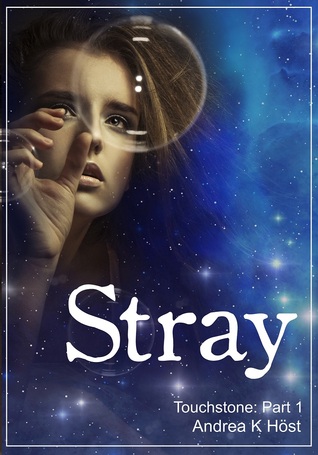But in the spirit of celebrating Science Fiction in all its mutations, I offer you this awesome alternate world science fantasy trilogy which you should definitely read this month, if not sooner.
Stray, Lab Rat One, and Caszandra are the diary of Cassandra Devlin, Australian girl who accidentally ends up on another planet and has to deal with what she finds there. There's lots of cool plot and setting details, but the strength of these novels is Cassandra's voice and character. Normal, practical, stoic but not immune to panic and despair, with a great self-deprecating sense of humour—it's the way she deals with everything the plot and setting throws at her that riveted me to the page.
I debated whether to say anything about the plot in this review. I read it without really knowing what I was in store for, so I got the fun of discovering all the surprising things that happen right along with Cassandra, and I really enjoyed that experience. So if you don't want any spoilers at all, then stop reading this blog, take my word for it that you'll like these books (and if you don't believe me, believe Sherwood Smith and Rachel Neumeier), and go start reading Stray.



Okay, you still need a little more convincing?
Stray begins with Cassandra walking home from school in Australia and accidentally walking out of the world.* I think we all (all of us who read Narnia, anyway) secretly wish that would happen to us, but Höst takes that trope and gives it the realistic treatment it deserves: how would an average Australian girl figure out how not to die on a strange, unpopulated planet with only the supplies in her school knapsack? I was completely sucked into the story and probably would have kept reading even if the whole story was just Cassandra alone vs planet.
(If it's sounding good to you then stop reading now!)
But then she gets picked up by some patrollers and taken to the safe planet where people actually live, and injected with a nanotech interface in her brain so she can learn the language and figure out how to live in this completely alien (but human) society. And that was pretty cool, and I would have kept reading even if it was all just adapt-to-new-technology-and-social-norms-and-make-friends-and-come-to-terms-with-never-going-home-again.
(Last chance. Don't make me tell you what happens next. Just go get the book now!)
But it turns out that a lot of people here have various crazy psychic powers, and Cassandra discovers that she enhances people's powers when they touch her. So off she gets whisked to the psychic ninja warrior training facility, because this planet is constantly fighting off monsters from non-real planes of existence, and someone who enhances psychic powers would come in really handy.
That is definitely all I'm going to tell you. No mention of really hot warrior guys in way cool form-fitting nanotech suits will cross my lips.
These books were a lot of fun, and they made more than five hours of travel time fly by. They also had so much substance, all kinds of interesting ideas, such fascinating world-building—that I know I'll be rereading them.
Something chocolate and chewy . . . oh! the dessert we shared when I took my daughter out for dinner in Ottawa: chocolate brownie tart with peanut butter mousse. Mmmmm. Yes.
*That sentence suddenly reminded me of a book I remember loving when I was young: A Walk Out of the World by Ruth Nichols. I don't remember anything about the plot, but just seeing the cover again when I googled it brought back intense happy feelings. This book obviously impacted me greatly; I should try to get my hands on a copy and reread it.
This sounds really intriguing! (I read your whole review.) I don't normally like a lot of science fiction, but I do love sci-fi with a female protagonist and this sounds like it is really unique.
ReplyDeleteIt's definitely not hard sci-fi. I think the term science fantasy is appropriate because it's basically a fantasy story but instead of fantasy kingdom and magic it's planets and nanotech.
DeleteAnd it's very much a character-based story.